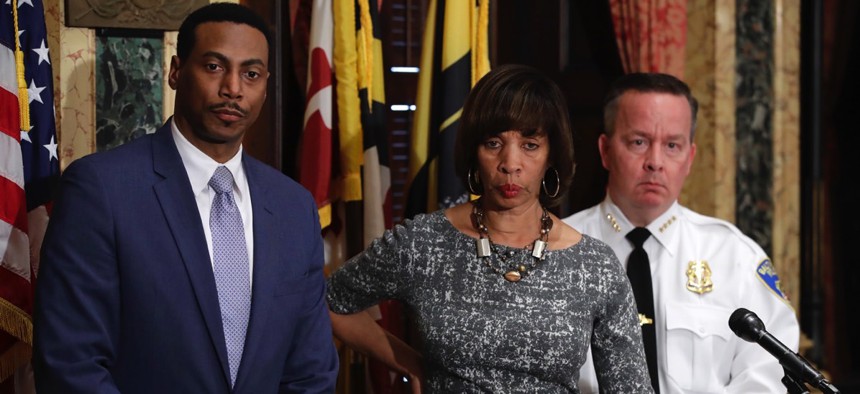Feds Tell Judge They Have ‘Grave Concerns’ With Baltimore Police Consent Decree

Interim City Solicitor David Ralph, Baltimore Mayor Catherine Pugh and Baltimore Police Department Commissioner Kevin Davis answer questions on the U.S. Department of Justice's request for a continuance on a consent decree hearing. Patrick Semansky / AP Photo
Also in our State and Local Daily Digest: Rural Texas lawmakers target bullet train; agency criticized for not spending money quickly enough; Newark mayor calls ICE deputization efforts “unconstitutional and un-American.”
POLICE REFORM | The U.S. Department of Justice has “grave concerns” about the proposed federal consent decree with the Baltimore Police Department. That’s according to John Gore, the Justice Department’s assistant attorney general in the Civil Rights Division, who argued in federal court on Thursday that it was unsure whether the agreement will improve public safety and needs time for more study. Baltimore’s acting city solicitor, David Ralph, said that there’s no need to pause. "We would like to move forward,” he said. A federal judge had earlier denied Attorney General Jeff Sessions’ request for a 90-day delay in moving forward with the consent decree. [The Baltimore Sun]
TRANSPORTATION | Divides between rural state lawmakers in Texas and their colleagues from in and around Houston and Dallas have led to nearly 20 bills that could thwart development of a privately built 240-mile-long high-speed passenger rail line between the two cities. Five bills were passed out of a key committee on Wednesday. State Sen. Charles Schwertner, a Republican, said efforts by rail skeptics in the Texas Legislature were “simply about taxpayers and keeping them off the hook should a private high speed rail project fail.” The Texas Central railroad project’s backers have pledged not to take any state funding to build the project, which is a partnership with Central Japan Railway, which runs the Shinkansen bullet trains. While the project has major cheerleaders in Houston and Dallas, much of the opposition has come from rural areas along the proposed right of way. [Houston Chronicle; Texas Tribune]
And in California, Democratic Gov. Jerry Brown is facing a potential fight on a transportation issue of his own. It’s down to the final days before a vote in the state legislature on Brown’s $52 billion tax plan for transportation and the governor is clearly frustrated by resistance to his initiative. “You want to have a screwed up state with a bunch of potholes? Go ahead, but that’s insane,” he said last week. Money generated by the tax plan would go toward the backlog of road, highway and bridge repairs that the governor’s office estimates to cost $130 billion. Legislative Republicans are backing the measure, while Brown’s own party is balking at the deal. [Los Angeles Times]
Meanwhile, the San Francisco Municipal Transportation Agency is taking heat for moving too slowly to spend $500 million in voter-approved bond financing. The measure that allowed for the borrowing passed three years ago, but the SFMTA has spent just $12 million, or roughly 2 percent, of the total that was approved. “With each passing day the value of this money goes down while the cost of construction goes up,” said Board of Supervisors President London Breed. [San Francisco Examiner]
IMMIGRATION | A sign declaring Malibu, California an “Official Sanctuary City ‘Cheap Nannies and Gardeners Make Malibu Great!’ (Boyle Heights Not So Much).” cropped up on the shoulder of the Pacific Coast Highway sporting the official seals of the city and state. Except Malibu never sanctioned it. Boyle Heights is a working class neighborhood home to mostly Latinos “To make a derogatory comment about that place is very childish and inappropriate. I’m embarrassed by that,” said Mayor Pro Tem Skylar Peak, one of the officials who helped make Malibu a sanctuary city last month. “We have a lot of immigrants who work in Malibu. It’s probably the majority of the employees here.” [Los Angeles Times]
Newark, New Jersey, Mayor Ras Baraka called attempts to deputize local police to assist Immigration and Customs Enforcement “unconstitutional and un-American.” "[T]hey're trying to intimidate us into being what I've called fugitive slave catchers, run around and do their bidding in our cities, and if we refuse to do that then it makes them difficult to continue their policy because they don't have the resources to run down the undocumented residents locally," he said. Newark is a sanctuary city. [NJ.com]
CAMPAIGNS AND ELECTIONS | It was a rough election night Tuesday for incumbent mayors and village presidents in the suburbs around Chicago, as 17 who were up for re-election were defeated. Many office-holders retained their seats. But some election-watchers see the losses as reflective of broader trends in the area’s local politics, such as political action committees funneling relatively large sums of money into races. “There is a level of tough campaigning," Cook County Clerk David Orr said. "It's not that the Cook County suburbs were a gentleman's club, but there's some tough stuff going on out there." [Chicago Tribune]
Donald Trump Jr. has been going around his gun club telling members he might run for New York governor. Being mayor of New York City or a member of Congress was less amenable to him. “Going back to doing deals is boring after 18 months,” Trump Jr. said. “The politics bug bit me.” The Trump Organization denied a run would happen “at this time”. [Page Six / New York Post]





